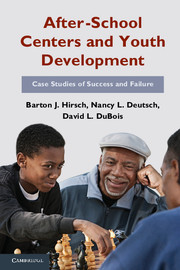Book contents
- Frontmatter
- Contents
- Figure and Tables
- Preface
- Introduction
- Midwest Center
- North River Center
- 6 A Study of Organizational Dysfunction
- 7 Undercutting Tweetie: The Trials and Tribulations of a Youth Leader
- 8 Beyonce: A Good Friend Is Hard to Find (and Keep)
- 9 Putting It All Together: North River and Midwest Centers
- West River Center
- Conclusion
- Appendix Data Sources
- References
- Index
7 - Undercutting Tweetie: The Trials and Tribulations of a Youth Leader
Published online by Cambridge University Press: 05 June 2012
- Frontmatter
- Contents
- Figure and Tables
- Preface
- Introduction
- Midwest Center
- North River Center
- 6 A Study of Organizational Dysfunction
- 7 Undercutting Tweetie: The Trials and Tribulations of a Youth Leader
- 8 Beyonce: A Good Friend Is Hard to Find (and Keep)
- 9 Putting It All Together: North River and Midwest Centers
- West River Center
- Conclusion
- Appendix Data Sources
- References
- Index
Summary
Tweetie is the type of teen you just can’t miss. A gregarious, attractive fifteen-year-old, she makes her presence known in a positive way, taking on leadership roles and acting as a friendly emissary to center visitors. Tweetie started coming to North River in the third grade. Three of her siblings also attend the club, making Tweetie and her family a center institution. She knows all the staff well and has an especially close relationship with Scottie, who serves as a big brother and father figure to her. Tweetie is a constant presence at North River and is involved in many club activities. Yet despite her deep involvement in the center and her close relationship with Scottie, Tweetie’s year was plagued by roadblocks. A number of incidents thwarted her natural leadership potential, including conflicts with staff and activities that were dropped. These roadblocks appeared to decrease her attendance at the center. Further, and perhaps more importantly, such undercutting experiences likely dampened potential positive effects of her involvement with North River. Tweetie did not make many gains over the course of the year. She was a high-achieving youth from the start, but multiple opportunities for her to develop her leadership skills at the center were not realized. Tweetie avoided getting involved with the gangs and violence that were prevalent among the girls in her neighborhood, but we can only imagine what gains she may have made if she had received greater, active support from North River.
- Type
- Chapter
- Information
- After-School Centers and Youth DevelopmentCase Studies of Success and Failure, pp. 155 - 182Publisher: Cambridge University PressPrint publication year: 2011



